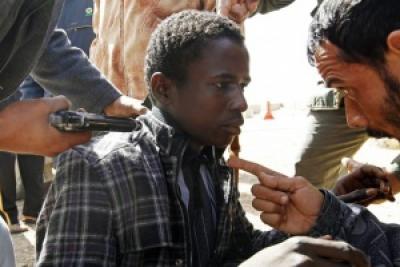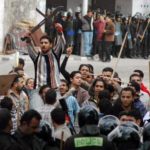On the border with Egypt refugees from sub-Saharan Africa tell of racism, rape, mercenaries, and a war waged by foreign Islamists.
By Menelaos Agaloglou
 Saloum, Libya:
Saloum, Libya:
(This is the second of a two-part report from Libya)
Refugees from the war in Libya have gathered in the border region with Egypt. The stories that I hear from them stand in stark contrast to the stories told in Benghazi.
Libya has a long history of racism. The country was part of the slave trade until 1930, and under Italian colonialism Libyans saw themselves as Mediterranean and superior to ‘blacks’. Gaddafi’s pan-African policy has outraged many Libyans who see their resources being used for people they never meet and have no natural affiliation with. The arrival of thousands of Africans to work in Libya, mainly in the oil sector and in factories, has increased the anger of locals. Muslim Libyans were never happy with the arrival of black African Christians who they accuse of bringing prostitution, crime and drugs to their country. In 2000 this anger exploded into a pogrom against the sub-Saharan migrant population. At the time Libyans were hoping not only to eject black Africans from the country, but to also snuff out the pan-African policy of Gaddafi, which in reality can be argued to be more like an Arab approach to colonialism rather than real support for sub-Saharan African countries. Currently, Gaddafi is using black mercenaries to suppress the rebellion. As a result hundreds of black Africans living in the east of Libya have been attacked by rebels who accuse them of being pro-Gaddafi.
Tales from the camps
The day I visit the refugee camps in Saloum there are around 2,000 refugees. Most of them are from the well known trouble-spots of Africa. They complain because they miss their old, good life in Libya. Now they face water shortages and are given only two meals per day. Many complain about the quality of food and the sanitation standards in the camps. Almost all use phrases such as “in Libya we had a life”, “Gaddafi welcomed us as Africans” and “we were respected”. They tell me of atrocities including rapes and massacres perpetrated by the rebels against Africans in Libya. A Turkish oil worker who escaped Libya told of the murder of 70 to 80 Sudanese and Chadian workers with axes by Libyans who accused them of being mercenaries.
Alexander is from Eritrea. He cannot return to his home. He worked for three years in a construction company as a civil engineer, and enjoyed the comfort of his salary and his life in Libya. He believes that the people of Libya do not like black people, even black Libyans. “Gaddafi used blacks for everything. Now that we are out, the country will stop operating,” he says. He says many people are still missing and that he witnessed the killing of 24 people from Chad when they left Benghazi for Egypt. Even though he left behind part of his income, he is not willing to go back to Libya. He is angry with the international community because he says they have left refugees sleeping in open tents without proper sanitation or nutrition.
Azab is also from Eritrea. She tells me she cannot understand why “this mess” happened. “Libyans had a permanent salary, they were free to travel and the government provided cheap houses and cheap cars for them. Why are they doing this? They were not allowed to speak about politics and they should respect this.” Another refugee, Mohammed, is from Niger. He worked in Misrata as a company driver. “There was no protection in Misrata after the conflict started and the rebels did not pay our salaries” he says. He tells me that the rebels stole around 10,000 Libyan Dinars (about $5,700) from him.
Saffar Hamid is from Darfur, in Sudan. His village was burned down and he became a refugee seeking safety and work in Libya eight years ago. “Before problems started in Libya, the country was safe. We were working with a high salary and we were able to support our people back home,” he says. After the rebellion began he says his skin color became a problem. He is angry because he cannot go back to Sudan. “If we return we would be killed or sent to prison,” he says. “People have nothing back there, all our animals were taken by the Janjaweed.” He says that now in Libya it is also unsafe for him because the rebels take people from their houses and accuse them of being mercenaries. He tells me that in Al Bayda there were 100 Sudanese men working as herders who the rebels captured and forced to be photographed. He explains that the situation in Benghazi is not serving anyone’s interest. “In Benghazi,” he says, “even children had weapons and they could kill you.” Other Sudanese refugees sitting nearby tell me about the rape of a 12-year-old Sudanese girl by the rebels.
Islamists and the arms trade
A Somali tells me that he believes that the international community is wrong in helping the rebels and that they will understand this only when it is too late. He claims that in the last days before he left for the border he noticed foreign Islamic militants. “The revolution is not perpetrated by innocent people,” he says. “This was not a civil revolution from the first day. Half of the people fighting in Benghazi were not Libyans. They were hiding the weapons inside the mosques. There is a new element in Benghazi – extremism, and that is why they changed all the Imams.” Several refugees who I speak to argue that there are divisions inside the rebel movement. They say there are two forces, the youth, who want freedom and elections, and extremist Islamic elements who want to take control of the weapons and – subsequently – the movement.
Abdullah, also from Somalia, speaks about the arms trade in Benghazi, arguing it is a war for profit. He says most of the weapons are being bought by Islamists and that the uprising is “chaotic”. “In Benghazi weapons are on sale for 1,200 Dynars (about $988) which have been stolen from the army. Who do you think gives them all this money?” Most of the refugees I meet agree that most Libyans are tired of Gaddafi and his relatives, but that Libyans “do not support the rebels”. Ibrahim, another Somali, tells me that if the rebels succeed instability in the region will also increase, especially in the southern neighbors of Libya: Chad, Niger and even Mali, as they all have militant groups in their desert terrains.
“I will not betray Gaddafi”
In the almost unbearable afternoon heat I visit a tent to talk with more young men from Somalia. Abdullah Mohamed Ali has spent his childhood on the road. He left Somalia when he was two-years-old, and stayed in Sudan for ten years before he reached Libya. Abdullah was educated in Libya and speaks Arabic with a Libyan accent. Abdullah’s eyes cloud when he talks about Libya. “In Libya,” he says, “I had everything, house, salary, TV, laptop, Playstation. I was living like you, the same way you are living in Europe.” He says Gaddafi welcomed many Africans and treated them with respect. He says this is something he will not forget. “I support Gaddafi, he gave me everything. I will not betray him now.” He says he understands why the rebels are fighting black Africans. “Gaddafi gave $100 to Africans who wanted to cross to Europe to kill the rebels. He even gave them houses and residence permits in the western parts of the county.” Other reports suggest mercenaries were paid as much as $10,000 to fight, and that Gaddafi is using children as young as 13 in his army. However, Abdullah says he cannot understand why the war began, as he says Libyans “had everything” and they should respect their leader.
It is true that Libya holds Africa’s largest crude oil reserves and that its oil wealth is spread over a relatively small population which has managed to sustain higher living standards than neighboring countries. Libya has a per capita GDP of $13,000, compared to $9,500 in Tunisia and $6,200 in Egypt. The Somalis I speak to say Libya is a paradise compared to their home country. A Somali named Abubakar says that if NATO did not get involved in the war the rebellion would have lasted only a month. He says the war against Gaddafi is influenced by Western imperial interests and the Western media. As with many others I speak to, he tells of the killings of blacks in Benghazi and the reports of black African girls being raped by rebels. The strories I hear in the refugee camps along the Egyptian border remind us that Arab Libyans are not the only ones suffering in this war.

